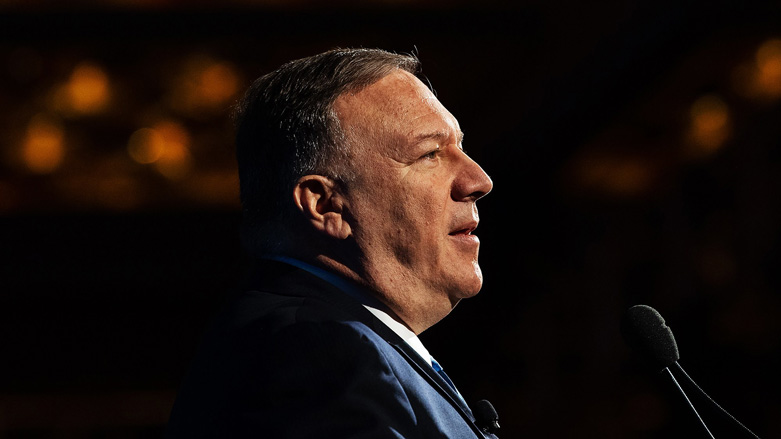US announces measures against Iranian leadership for human rights violations

WASHINGTON DC (Kurdistan 24) – Secretary of State Mike Pompeo announced on Thursday that the US is taking new steps to promote human rights in Iran and show its solidarity with the Iranian people.
As Pompeo explained, the Treasury Department sanctioned two Iranian judges, Mohammad Moghisseh and Abolghassem Salavati.
Both Moghisseh and Salavati head branches of Iran’s Revolutionary Court. “For years,” a Treasury Department statement explained, they have “punished Iranian citizens and dual nationals for exercising their freedoms of expression or assembly.”
The two judges have been prominently involved in “the Iranian regime’s miscarriage of justice in show trials in which journalists, attorneys, political activists, and members of Iran’s ethnic and religious minority groups were penalized for exercising their freedom of expression and assembly and sentenced to lengthy prison terms, lashes, and even execution,” the Treasury Department affirmed.
Kurds have been a particular target of the regime’s repression. Although Kurds are estimated at less than 10% of Iran’s population, nearly half of the political prisoners in Iran’s jails are Kurds, as the UN reported in August.
Read More: UN Special Rapporteur says half of Iran’s political prisoners are Kurds
Pompeo, citing repeated examples of the regime’s repression in violation of its own laws, noted that Iran’s constitution “says that ‘all people of Iran, whatever [the] ethnic group or tribe to which they belong, enjoy equal rights.’”
“But the regime treats so many ethnic minorities in Iran as second or third class citizens,” he said.
The European Union sanctioned both Salavati and Moghisseh after Iran’s June 2009 presidential election. That vote resulted in the re-election of Mahmoud Ahmadinejad. However, there was strong suspicion that the vote counting was rigged, leading to widespread protests and the emergence of Iran’s “Green Movement.”
The regime responded with severe repression, in which Salavati and Moghisseh were involved. Many protestors were arrested and subject to a series of show trials. The two judges regularly meted out the stiff sentences sought by the regime.
Branch 15 of the Tehran Revolutionary Court, over which Salavati presides, “is a main venue for the prosecution and harsh sentencing of journalists and internet users,” the Treasury Department explained. In that capacity, Salavati has earned the name, “The Judge of Death.”
Brian Hook, Special Representative for Iran and a senior advisor to Pompeo, explained to journalists that Salavati was responsible for imprisoning two Americans. Jason Rezaian, an American-Iranian who had been Tehran bureau chief for The Washington Post was one. Rezaian was arrested in 2014 and then charged, tried, and convicted of espionage, before being released in 2016.
The second American imprisoned by Iran, Salavati, Xiyue Wang—a graduate student at Princeton University, working on his Ph.D. in history—was similarly detained and charged with espionage. After three years in jail, he was released earlier this month in a prisoner swap for an Iranian scientist, whom the US had arrested for attempting to illegally export biological materials to Iran.
Hook was involved in the prisoner exchange and Wang talked to him about Salavati. “It is important,” Hook said, that people understand “how many lives [Salavati] has either ended” by death sentences “or ruined by sending them to jail.”
In addition to sanctioning the two judges, the US also imposed visa restrictions on “current or former Iranian officials and individuals” involved in the repression of peaceful protestors or “for inhibiting their rights to freedom of expression or assembly,” Pompeo explained.
The restrictions also apply to family members. “We don’t want them or the children of the regime elite” coming to the US and “enjoying the benefits and the freedoms” here that they deny their own people, Hook said.
Regarding Tehran’s aggression toward neighboring states, Hook affirmed, “Iran did attack Saudi Arabia on September 14th,” as he added, for emphasis, “It was a direct attack.” Hook explained that earlier in the day, the US ambassador to the UN had presented evidence to the Security Council demonstrating Iran’s responsibility for the assault.
